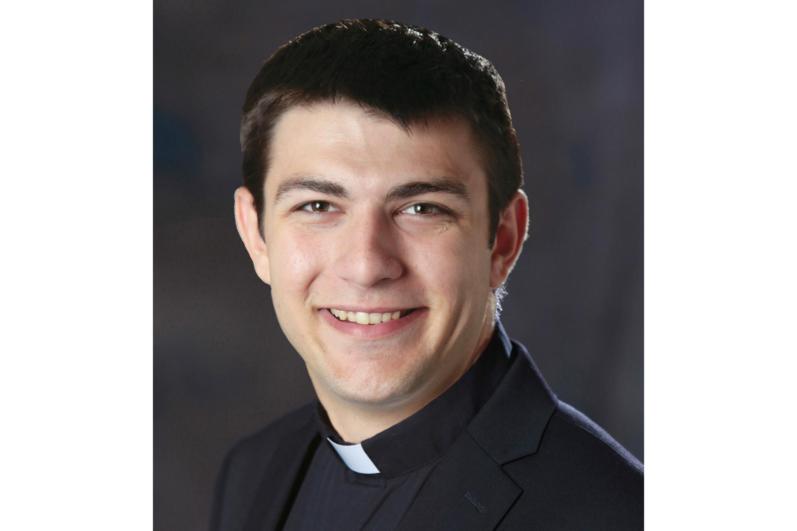Ordination Class of 2022: Deacon Joseph Ferme
Ordination Class of 2022: Deacon Patrick O'Connor
Ordination Class of 2022: Deacon Bertrand Proulx
Ordination Class of 2022: Deacon Nathaniel Sanders
Ordination Class of 2022: Deacon Nicholas Stano
Ordination Class of 2022: Deacon Maxwell Chukwudiebere
Ordination Class of 2022: Deacon Steven Restrepo
This is the fifth in a series of articles profiling the seven men who will be ordained to the priesthood for the Archdiocese of Boston at the Cathedral of the Holy Cross on May 21.
ROME -- Deacon Joseph Ferme describes his discernment process as "a product of slow development of the desires that, as I look back, I can recognize as coming from God."
Growing up on Long Island, New York, faith was not a particularly large part of his life, though he attended Catholic schools and was part of his high school's youth group. He also enjoyed math, science, and sports -- especially baseball.
He decided to study biochemistry and molecular biology at Boston University, thinking he would go into research. However, it was not until his junior year that he realized that was not where he saw his future.
It was also in his college years that the idea of becoming a priest first crossed his mind. He had continued attending Sunday Mass, but he found himself living in ways that conflicted with following Christ. Speaking to The Pilot in February, he said his faith at that time was "lukewarm" and lacked a personal relationship with Jesus.
One of Deacon Ferme's friends found out he was Catholic and began inviting him to the school's Newman Center. They held a two-day retreat every semester, and Deacon Ferme's friend convinced him to attend. It ended up being "a really transformative experience" for him.
"It certainly wasn't like I left the retreat a totally changed man, but I can say that I had left facing a new direction," Deacon Ferme said.
After that, he was invited to a local vocation retreat. Since he had enjoyed the previous retreat, he decided to try this one, too. By the end, Deacon Ferme realized that the priesthood was an option and something he was interested in. There were already BU graduates in seminary, so it was seen as a normal thing for young men at the school to consider.
"I realized I really wanted to be a priest and hoped that's what (God) was calling me for," he said.
After finishing his undergraduate degree, Deacon Ferme spent a year interning at the school's Catholic Center while discerning the priesthood.
In 2016, he was accepted into St. John's Seminary. As he entered pre-theology, he had a strong desire to learn about the saints and aspects of Catholicism that he felt he had been "missing out on" throughout his life. He was greatly influenced by reading the biographies of St. John Vianney and St. Therese of Lisieux in particular.
Deacon Ferme said he had "such an appetite to continue to learn about the faith and to learn about the saints and to immerse myself in what I felt like I'd been missing out on all these years. Now I could dive headfirst into the richness of the faith."
After two years at St. John's, Deacon Ferme was asked to continue his formation at the Pontifical North American College in Rome and is thankful for "the amazing blessing of living in Rome, and being so close to the Holy Father and to the center of the universal Church."
He had just returned to Rome after a pilgrimage to the Holy Land when the coronavirus began to spread and raise concerns around the world. After about two weeks in lockdown, the decision was made to close the campus and send the seminarians to their homes or parishes.
From March through August 2020, Deacon Ferme and three other seminarians stayed with a few priests at St. John the Baptist Parish in Peabody, trying to keep up their studies and serve the parish. After that, he was able to return to Rome, and formation continued in a "pretty normal" fashion.
"It's kind of amazing now that the little things we still have to do, whether it's masks, extra forms or paperwork, have actually become kind of normal," Deacon Ferme said.
He came back to the States again last year to serve a summer assignment at St. Paul Parish in Cambridge. He was ordained a deacon after returning to Rome in the fall -- and he gave his first homily on St. Therese's feast day.
Deacon Ferme will continue his studies in Rome for two years after his ordination.
One of the best things about living in Europe, he said, is being so close to the places where different saints lived, died, or are buried, allowing him to "tangibly experience the history of the Church."
"We can see and touch and experience the history of our Church and the lives of the saints in a way that is really important and formative, and hopefully something that all of us here will bring back in some way," he said.



















